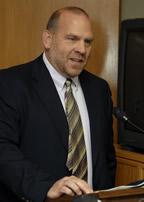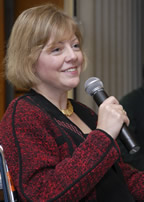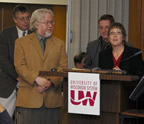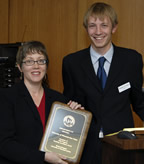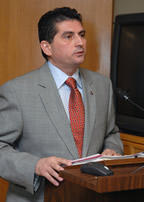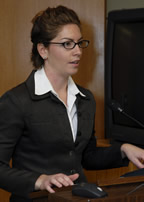MADISON — Educators at three University of Wisconsin System campuses were honored Friday (Nov. 10) for their distinctive teaching and learning philosophies, and for their willingness to adapt and innovate in serving students.
The Board of Regents distributed the 14th annual Teaching Excellence Awards to:
- John Koker, professor of mathematics, UW-Oshkosh;
- Kathryn Olson, associate professor of communications, UW-Milwaukee; and
- Department of History, UW-Eau Claire.
“All of us in this room understand what a valuable resource we have in our faculty and our academic staff,” said Regent Danae Davis of Milwaukee, who chaired the Regent selection committee.
Davis said selecting the recipients from the pool of nominees was extremely difficult, and praised the creativity, dedication and passion of all the nominees for the award.
Koker, a professor of mathematics at UW-Oshkosh, is an extraordinarily gifted teacher, said Regent Jesus Salas of Milwaukee.
“His achievements are not limited to outstanding teaching, but extend beyond the walls of the university,” Salas said. For example, Koker has attracted grants to train middle- and high-school teachers, with a special focus on students in Menomonee tribal schools.
Salas said Koker was recognized for his focus on encouraging students to understand problem-solving, rather than just trying to report correct answers.
“He may be teaching his students math, but he is also teaching them how to think through other aspects of their lives,” Salas said.
Koker said he was fortunate to be honored with the award because he knows so many other deserving professors. He said his approach to teaching follows his realization that students don’t learn by watching him do math, they learn by being engaged in problem-solving, and then reflecting on the process.
“Learning is about finding one’s way through the unfamiliar and making sense out of it,” Koker said. “Teaching and learning are difficult, but in a challenging and supportive environment, our students can grow and become lifelong learners.”
At UW-Milwaukee, Olson uses innovative methods to connect the material she teaches to the lives of her students, said Regent Charles Pruitt of Shorewood. She works not only with students in the classroom, but also conducts educational outreach to improve community understanding of politics, he said.
“She has an interest in building a bridge between academic scholarship and community understanding,” Pruitt said. “She is a role model for what it means to be a teacher, for what this university system is really all about.”
Olson said she became a professor because she truly enjoys the process of learning. In her teaching, she actively looks for ways to connect with different kinds of learners, she said.
She thanked the active communities in the UW System that are willing to support teaching and learning, and praised the excellent teachers throughout the UWM communications department.
Olson credited UWM and UW System professional development programs for the opportunity to improve her teaching and scholarship. Further, she said she appreciates the UW System’s vision that “keeps students and citizens at the center.”
In introducing the recipients of the departmental award, Student Regent Christopher Semenas of UW-Parkside, a history major himself, said he has found that more and more students entered the field of history after Sept. 11, 2001.
“We want to find the answers to the problems of today and tomorrow,” Semenas said. “We look to the past to see that.”
The UW-Eau Claire History Department furthers those goals, he said, by offering students the chance to learn from a diverse faculty, by supporting undergraduate research, and with efforts to improve elementary and secondary education. The department has also attracted external grant funding, he said.
Students in the History Department have the opportunity to partner with local museums and historical agencies, and testify to the collaboration, dedication, faculty mentorship, and teaching excellence that the department offers, Semenas said.
Professor Katherine Lang, who appeared with several of her colleagues, including Chancellor Brian Levin-Stankevich, a Russian History scholar, thanked the Board for the departmental award.
“It’s my privilege to chair a department of immensely talented, unstoppable faculty who put student learning first, period,” Lang said.
The History Department is committed to teaching students about global culture and this multicultural nation, Lang said. She said she is proud of the department’s work with K-12 teachers, primarily funded through national Teaching American History Grants, which recently led the department to create a public history program. She also thanked the Eau Claire community for its support and interest in the department’s work.
“Our students not only do outstanding historical research, but they also present to the public,” Lang said. “History becomes more real for them, and the research becomes more real too.”
The awards recognize the outstanding academic quality of UW teachers and departments, and in part, explain the high demand for admission to the UW, said Regent President David G. Walsh.
“No one would want access if we didn’t have quality,” Walsh said.
Read a news release about the Teaching Excellence Awards
UW System honors veterans; UW, Dept. of Veterans Affairs to seek funding for Wisconsin GI Bill
For more than a century, veterans have been a key part of the University of Wisconsin, and the UW System welcomes current veterans to continue their higher education using the benefits of the new Wisconsin GI Bill, Regents learned Friday.
“Wisconsin’s veterans are part of the social bedrock upon which our state’s public university system is built,” said UW System President Kevin P. Reilly.
He said he and Secretary John Scocos of the Wisconsin Department of Veterans Affairs will ask the Legislature to provide state funding to pay for the tuition remissions promised under the new Wisconsin GI Bill.
Reilly said he hopes the state will see to it ”that all of the state’s citizens, and not just UW students, are helping to support veterans and their education.”
Scocos thanked the Board and several members for their support for veterans over their years of service to Wisconsin. The Wisconsin GI Bill is important, Scocos said, because time and inflation have meant that the federal GI Bill does not cover all of today’s educational costs.
“Wisconsin is probably one of the most progressive states in the nation of taking care of its veterans,” Scocos said. “This lifetime benefit welcomes Wisconsin vets to return home. The biggest thing that we’ve heard loud and clear is that they want education, and they want health care.”
Liz O’Herrin, a Staff Sgt. in the Air National Guard, and a junior majoring in Communication Arts at UW-Madison, told the Board about her return to college following active military duty.
A volunteer for Vets for Vets, a student organization, O’Herrin said she was sworn in to her service two days after Sept. 11, 2001, and was twice deployed to the Middle East for a total of seven months.
She said she received great support from her professors and the university while preparing for her departure, and thanked the Board for their role in providing educational benefits to Wisconsin veterans.
“The transition form military to the education world is not an easy transition to make,” she said. “I can’t think of a better way to say thank you to our veterans than offering them a free education. It enriches our community, and everyone benefits from it.”
“Growth Agenda for Wisconsin” gains traction
Faculty, staff, students and citizens are showing their support for the university’s “Growth Agenda for Wisconsin,” a plan to leverage state investment to increase the number of four-year college degree holders and improve Wisconsin’s economy, Reilly said Friday.
The UW-River Falls Faculty Senate strongly endorsed the Growth Agenda in a recent resolution, and Reilly said all three branches of shared governance at UW-Superior – faculty, academic staff, and students — sent letter of support for the Growth Agenda to Gov. Jim Doyle.
Reilly said he traveled to the St. Croix Valley with UW-River Falls Chancellor Don Betz in recent weeks, where he met with several citizen groups, interested students, business leaders, and service clubs.
Regent President Walsh said that advocacy for support for the university needs to continue to be shared, but seems to be “gaining traction.”
“We have a lot to be proud of,” Walsh said. “We have a group of chancellors like we’ve never had before, and I think there’s a lot of enthusiasm and momentum.”
Reilly also noted that UW students turned out in large numbers for Tuesday’s statewide elections, and that six legislative districts in campus areas now have new representation. Three UW instructors were among new legislators elected on Tuesday, Reilly said.
He said he intended to work with UW political science experts to understand more about how citizens voted in Wisconsin.
“Regardless of whom they voted for, our young people did vote, and that’s an important and impressive fact,” Reilly said. “And they understand, too, that their votes do make a difference.”
Projections indicate that in some wards heavily populated by students, turnout increased by 66 percent over the last election.
In other news:
- Reilly told the Board that UW-River Falls and Chippewa Valley Technical College have received a five-year, $2.5 million grant from the Department of Education to expand online learning. The grant, called “Stronger Together: An Educational Partnership for the Changing Economy,” seeks to build a larger and more-educated workforce in an 8-county region of Wisconsin and Minnesota. Using the grant, the campuses will work together to educate students through web-based, distance and other alternative courses. Combined, the campuses serve 15,000 students, Reilly said.
- Reilly also noted the recent death of former UW-Stout Provost Bob Sedlak, who had served for 23 years at UW-Stout. Sedlak played a critical role in establishing UW-Stout’s School of Education, was an avid flower gardener, and was active in the Menonomie community.
- Reilly also praised the many accomplishments of Doris Hanson, the first woman to serve as the Secretary of the Wisconsin Department of Administration, who also passed away this week. Hanson knew that government works best when it works efficiently, Reilly said. Hanson was later elected to represent Monona in the Wisconsin State Assembly, and Reilly said she will be remembered for her work ethics, her example, and her contributions.
Walsh reported that, following efforts by the U.S. Department of Education, Gov. Jim Doyle has proclaimed Nov. 13-17, 2006, as International Education Week in Wisconsin.
Walsh read the proclamation, which encourages citizen and scholarly exchanges to promote understanding among cultures and societies around the world. It also notes the many study-abroad experiences of UW and Wisconsin Technical College students.
In other business, Walsh noted that UW-Madison now has the lowest tuition in the Big Ten, after Iowa raised tuition 6.9 percent this week. Further, he reported that the Board can expect a report from the Board’s Committee on Faculty and Staff Discipline in December.
In addition, Walsh said he has spoken with Sen. Judy Robson, the new majority leader of the Wisconsin State Senate, who said she expects to immediately address the appointments of the 10 Regents who have not yet been confirmed by the state Senate.
The full Board voted Friday to:
- Approve base salary adjustments for four senior academic leaders: UW-Platteville Chancellor David Markee ($13,551), UW-Stout Chancellor Chuck Sorensen ($10,868), UW-Superior Julius Erlenbach ($5,051), and UW-Platteville Provost Carol Sue Butts ($6,500);
- Grant authority to UW-Eau Claire to sell a parcel of land to the Department of Transportation for a multi-purpose trail project being constructed by the DOT;
- Grant authority to increase the project budget and construct the New Engineering Building at UW-Platteville;
- Grant authority to exchange a parcel of land for agricultural purposes at UW-River Falls, resulting in additional farm land for use by the College of Agriculture, Food and Environmental Sciences; and
- Grant approval to construct all agency maintenance and repair projects at various campuses, including roof replacements, space renovation, and utility replacements.
- Approve revised faculty personnel rules for UW-Green Bay;
- Appoint representatives to the UW School of Medicine and Public Health Oversight and Advisory Committee (OAC). Dr. Susan Goelzer and Mr. Douglas Mormann were reappointed to the OAC for four-year terms; Dr. Michael Fleming and Ms. Lorraine Lathen were appointed to the committee, also for four-year terms; and
- Authorize UW System Administration to recruit for a Senior Vice President for Academic Affairs.
In closed session, the Board voted to appoint Joe Gow, interim president of Nebraska Wesleyan University, as Chancellor of UW-La Crosse, at an annual salary of $184,000. Gow is expected to begin as chancellor on Feb. 1.
Learn more about new UW-La Crosse Chancellor Joe Gow
###
The UW System Board of Regents will hold its next meeting on Thursday and Friday, Dec. 7-8, in Madison.
Related: Read Nov. 9 (day 1) news summary

